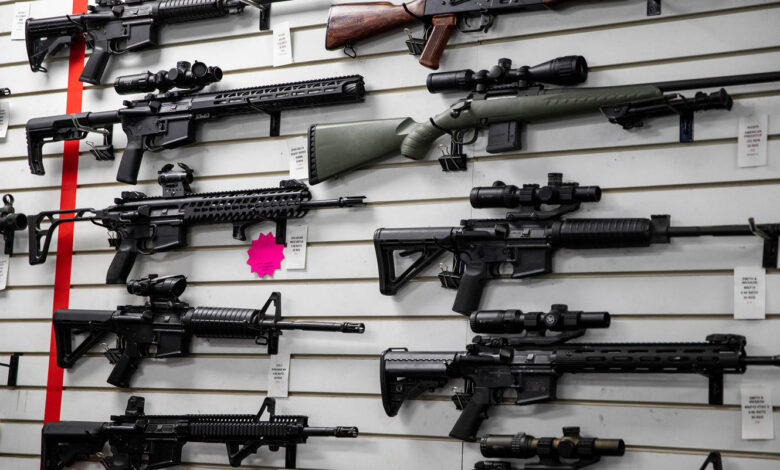
Indiana Lawmakers Trying to Kill Historic Suit Seeking Gun Industry Accountability
by Tony Cook, IndyStar, and Vernal Coleman, ProPublica
ProPublica is a Pulitzer Prize-winning investigative newsroom. Sign up for The Big Story newsletter to receive stories like this one in your inbox.
Series: Under the Gun:How Gun Violence Is Impacting the Nation
As America emerged from the pandemic, communities continued to experience a rising tide of gun violence. School shootings and the rate of children and teens killed by gunfire both reached all-time highs since at least 1999. ProPublica’s coverage of gun violence reveals how first responders, policymakers and those directly affected are coping with the bloodshed.
For nearly a quarter century, some of the world’s largest gunmakers have tried unsuccessfully to beat back a lawsuit brought by the city of Gary, Indiana, accusing them of turning a blind eye to illegal gun sales.
The lawsuit was one of dozens that cities filed against gun manufacturers in the late 1990s, but it is the only one to survive a barrage of legal challenges and legislation aimed at limiting the gun industry’s liability for crimes committed with their products.
Now, facing the prospect of turning over internal documents that gun-control advocates believe could contain damning evidence, the industry has returned to an important ally in a last-ditch effort to kill the suit: the state legislature.
Republicans, who hold supermajorities in both chambers of the Statehouse, are close to passing a bill banning cities from suing firearm manufacturers, dealers or trade groups. Instead, only the state could bring such a lawsuit. Significantly, it’s retroactive to Aug. 27, 1999 — three days before Gary filed its lawsuit.
The bill has strong backing from the firearms industry, which has dramatically ramped up its lobbying efforts at the Statehouse. The lawmaker who introduced the legislation, Rep. Chris Jeter, has made it no secret that the measure is intended to target Gary’s lawsuit.
“Really, this bill is an effort to take one last shot to try to eliminate this last pending case,” said Jeter, a Republican from Fishers, during a hearing on the bill this month. The bill was passed by the House last week and now moves to the Senate.
The effort is prompting anger in Gary, which is about 160 miles from Jeter’s largely suburban district. Mayor Eddie Melton called it “a morally bankrupt bill that protects the rights of manufacturers and disregards the lives of people in communities like Gary.”
“As someone who has experienced gun violence personally, I believe it is critical that we have the legal ability to hold bad actors accountable and to ensure the ongoing safety of our public,” he said in a statement. “Indiana House Bill 1235 removes the rights of Gary and any Indiana community to represent itself in a court of law.”
After years of legal wrangling, the Lake County judge overseeing the suit ruled last fall that the retailers and manufacturers who are defendants in the case must comply with the city’s requests to turn over decades of internal records as part of a legal process known as discovery. City attorneys are seeking thousands of documents detailing manufacturers’ market research, retailers’ firearms purchases and any communications about gun trafficking and straw sales — in which a gun is purchased with the intent to resell it to someone prohibited from buying firearms.
The House bill, set to take effect in July if signed by Gov. Eric Holcomb, appears aimed at preempting the exchange of those records. Writing in a Jan. 17 order, Judge John Sedia said the court will assess the impact of the bill if and when it becomes law but said the case will move forward for now.
Several pro-gun organizations have come out in support of the bill, at least one of which has direct interest in ensuring Gary’s suit does not progress.
The National Shooting Sports Foundation, which conducts political lobbying on behalf of the firearms industry, represents several of the manufacturers named in the suit. “It’s unfair to the industry members to have to defend a case and incur tens of millions of dollars in legal costs and bills for nearly a quarter of a century,” NSSF Senior Vice President Lawrence Keane said.
The NSSF backed the legislature’s prior attempts to kill the lawsuit in 2001 and 2015. With state courts having upended those efforts, and the suit nearing the trial phase, the NSSF has thrown both influence and funding behind this new push to halt Gary’s suit.
After spending no more than a few thousand dollars on lobbying Indiana lawmakers in recent years, its expenditures skyrocketed in the run-up to the bill’s introduction. The group spent about $143,000 on lobbying efforts in 2023, according to the most recent disclosure reports.
That includes about $88,000 through Barnes & Thornburg, one of the most influential lobbying firms at the Statehouse. Jeter was an attorney at the firm until 2015. Barnes & Thornburg did not respond to inquiries from a reporter.
Jeter declined to be interviewed for this story. In presenting his bill on the House floor, he adopted many of the same talking points — and at times, even some of the same phrases — as a firearm industry lobbyist who testified on the bill during a committee hearing a week earlier.
In a statement sent through a spokesperson, Jeter did not address the similarity between his comments and those of the industry. He also said he was not aware of anyone from his former firm approaching him to discuss the bill.
“The Gary lawsuit has been ongoing for nearly 25 years, and this is the third time the General Assembly has tried to end this frivolous lawsuit,” he said. “This is the right policy to ensure that we’re protecting lawful Hoosier gun owners’ personal information and aligning Indiana with federal law, which has already affirmed the firearm industry should not be held liable for criminal acts committed with lawfully sold firearms.”
During a hearing on the bill, Jeter tried to undermine the motives behind the suit. “The very fact that the case has been in existence for 24 years, to me, is de facto evidence that it’s frivolous,” he said. “I think the point of the case was to get to the discovery phase, and to ensure that the gun manufacturers had to spend a lot of money, which has largely been successful.”
Democrats in the legislature have questioned Jeter’s concerns that the disclosure of retailer transactions could expose the personal information of lawful gun owners, noting that court orders typically protect such information in civil cases.
Rep. Ragen Hatcher, a Democrat whose father served as Gary’s first Black mayor, disputed Jeter’s characterization of the suit, saying the courts have affirmed its legitimacy. “After three dismissals and three appeals and to continue to be revived by the court, there’s nothing frivolous at all about this case,” she said.
In 1999, Gary had a higher per capita murder rate than any other city in America, with most of the killings involving firearms. Gary was part of a national movement by mayors to take on industry practices and combat illegal firearms sales. Straw sales in Indiana have continued amid the court and legislative battles.
Gary spends millions each year to investigate and prosecute the crimes committed with those guns once they reach the streets, the city claims. Its suit targeted some of the most recognizable names in the industry, including Smith & Wesson, Glock and Beretta, as well as several gun shops in northwest Indiana.
With similar suits being filed around the country, the firearms industry mobilized legislative support at the state and federal levels to pass laws effectively immunizing gun retailers and manufacturers from civil lawsuits. One by one, the lawsuits died.
In Indiana, Republican state lawmakers tried in 2015 to halt the suit, amending an existing immunity statute to make it retroactive to days before Gary filed its complaint. Despite the law, the Indiana Court of Appeals affirmed the city’s ability to pursue its claims, and the suit continued.
Former Gary Mayor Karen Freeman-Wilson, who was in office in 2015, called it “hypocritical” to blame the city for delays in the case, noting that state lawmakers’ efforts have led to a long appeals process as the industry sought to have the case dismissed.
“It is déjà vu all over again,” said Freeman-Wilson, who is now president and CEO of the Chicago Urban League.
“We were very adamant about not just going forward, but really developing the trace data that would support the claims of the lawsuit,” she said. “I believe then and now that it is a public safety issue. I support the Second Amendment and responsible gun ownership, but this is really about dealers that target communities.”
Freeman-Wilson, who served as Indiana’s elected attorney general two decades ago, said lawmakers are “irresponsible in their blind commitment to gun manufacturers and dealers.”
Efforts to put an end to the lawsuit have also extended to the executive branch. The administration of then-Gov. Mike Pence reached out to Freeman-Wilson during her time as mayor in an effort to broker a deal on the lawsuit, she said. At the time, Indiana was competing with other states to attract firearms and ammunition manufacturers that were looking to relocate from blue states, where gun laws were more restrictive. The lawsuit was seen as a barrier.
“They wanted to know what it would take for us to resolve it,” Freeman-Wilson recalled.
She said there were discussions about setting up a fund for victims of gun violence and to help pay for prevention efforts, but those ideas didn’t go anywhere. Instead, she said, gun industry advocates proposed a cartoon character campaign, akin to Smokey Bear, to teach firearm safety to young people.
The city is being represented in the case by the Brady Center, a gun violence prevention group. Representatives from the Washington, D.C.-based nonprofit declined to comment on the new legislation.
The organization’s former president and CEO, Paul Helmke, said he believes the retroactive nature of the legislation can be successfully challenged in court, but at the very least it will set the case back for months or years.
“Now all of a sudden, once discovery has started and they’re getting ready to move to trial, they step in again to try to get extra protections that nobody else, no other business, no other industry in this country has except the gun industry,” said Helmke, a former Republican mayor of Fort Wayne.
He asked: “What are they afraid of?”
Jody Madeira, a law professor at Indiana University who teaches a course on the Second Amendment, said she believes that the legislation violates the city’s right to due process and that lawmakers are exceeding their constitutional powers and unlawfully encroaching on those of the judicial branch.
“This is the Indiana legislature’s latest attempt to jettison the longest-lasting gun lawsuit in U.S. history, thwarting the judicial process to ensure that the firearms industry remains above the law,” she said during a hearing on the bill. “Now old enough to drink, Gary’s lawsuit is the last of its kind. The Indiana Supreme Court has continuously affirmed Gary’s right to bring this lawsuit. It’s not frivolous.”
Supporters of the legislation, however, argue that the same constitutional arguments could be made of previous laws that granted immunity to the firearms industry.
“The state can, for solid policy reasons, foreclose certain causes of action or eliminate liability in certain areas,” said Guy Relford, a gun rights attorney who has helped write some of Indiana’s gun laws. “Its ability to do so has been upheld for generations, notwithstanding those kind of constitutional arguments.”
The legislation now heads to the Senate, where leader Rodric Bray, a Republican, said he expects it to receive a warm reception.
“We’re a strong Second Amendment caucus,” he said. “I suspect there is an appetite for that.”




